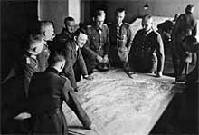|
|
||||
|
|
by Donald Levit  Battles have made and unmade nations, freed and enslaved continents, spawned and obliterated civilizations. Stalingrad is a documentary focusing on what may be the Mother of Them All, an eerie echo of Napoleon's Moscow mistake and beggaring one-point-six-million dead at Leningrad -- the Battle of Stalingrad. In some four months of siege, struggle and counterattack, the dead and wounded may have run to seven figures. Among General Friedrich von Paulus's half-million-man Sixth Army, supported by Panzer divisions and Italians, Hungarians and Romanians, the mostly mortality casualty rate was over sixty percent, and of the hundred thousand who would surrender in February 1943, a mere six thousand lived to return home from forced labor a decade later. Reduced to rubble, its citizenry dead or dispersed, the city would be rebuilt and, eighteen years afterwards, regain its original name of Volgograd, for Europe's longest (3,700 km.), easternmost, almost Asian river. Exceeding his grasp, utterly rejecting withdrawal, Hitler had passed his high-water mark, Western civilization would survive. Sixty years later, with first-time access to certain Russian archives and scratchy 8 mm soldiers' films, and interviewing the fast-dwindling numbers of survivors, TV documentarian, director and writer Sebastian Dehnhardt teams with Jörg Müllner, Christian Deick and Manfred Oldenburg in organizing and clearly explaining the folly and courage of those months. Already shown on television in Germany and Russia (and an HDTV station in Dallas, Texas), Stalingrad consists of three parts of fifty-two minutes each, which the filmmakers hope to edit down further to two hours for commercial release. At a press session following the New York Film Festival screening, the fortyish director remarked that at his death Sergio Leone was planning to tackle the theme but that previous cinema treatments have romanticized events, played fast and loose with history, whereas it is the unvarnished truth which stretches belief. No German snipers, for instance, were involved in the unaccustomed house-to-house phase -- an obvious reference to "based on the true story" Enemy at the Gates -- and, yes, horse-, cat- and dogmeat and then human flesh were resorted to, by both sides, during the winter war famine: "I never thought it could taste so good!" One journalist suggested improving film maps to indicate location within Europe, to which Dehnhardt admitted that that might indeed be necessary for U.S. audiences. The 3-D-Animation maps are quite excellent, however, and clear, using what resembles a blue tide for German forces (code name Operation Blue), and red for the Soviets (termed "Russians" at the Q&A). Another recommended that British-accented voice-overs -- with the interviewee's Russian or German audible beneath, as on most European TV -- not be used for, say, Hitler, Goebbels and Göring. Interspersed among the digitally enhanced, occasionally colorized archival footage, such interviews are unusually well done, if too pervasive in Part II, "The Kessel" ("Cauldron"), and especially III, "The Doom." Wisely in view of the subject, no attempt is made to set speakers against the normal backdrop of home and hearth; rather, on a black background unrelieved except for a red "Stalingrad" underlined in red blood-flow and the person's name and rank or occupation, faces are set to one side or another, without softening distraction. Often undelivered "Letter[s] from the Battlefield" are read, as well. Shots of sudden battle death, of grotesquely twisted frozen corpses (-50°), tank charges and artillery fire, weary faces and long files of POWs, are juxtaposed with home-front newsreels and propaganda films of both sides. Insisting on holding his name-city at all cost, Stalin refused to let civilians evacuate, while the Führer had already also passed into megalomania, determined to capture his opposite number's city despite warnings from his military staff and pleas from the front. Soviet commander Chuikov's sixteen divisions held, and General Zhukov's intelligent pincers movement would prevail, but at the staggering price resulting from the dictators' intransigence. New facts are unearthed, such as the long withheld revelation that ten thousand of the invaders did not surrender on the official February 2, 1943, but kept up hostilities from sewers for another month. There are human acts in the midst of carnage -- a German candy bar for a child, sometimes kind treatment of scared prisoners, foxhole Christianity, conversions here and there to Communism, doctors treating the enemy ("no fascists, only men"), admissions that Nazis surprisingly had no horns and were friendly -- although what must ultimately emerge is admiration at human courage balanced with horror at what Melville's "Ah humanity!" can do. The film's three parts overlap, as the director acknowledged, each beginning with a brief tie-back to the previous segment. With so much material -- too much, perhaps -- and an unfortunate increasing number of interviews, Stalingrad becomes too long and runs out of steam. Part I, "The Attack," is excellent, and one hopes that, tightened and shortened, the final unified version will turn out equally fine. (Released by German United Distributors; not rated by MPAA.) |
||
|
© 2025 - ReelTalk Movie Reviews Website designed by Dot Pitch Studios, LLC |



